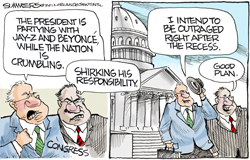On Jan. 23, Florida Gov. Ron DeSantis (R) announced that the Florida Department of Education (FDOE) would block the AP African American Studies course. The decision was based on the available draft curriculum, claiming the course violated the state’s “Stop Woke Act. ” The official rejection claimed the course “significantly lack[ed] educational value.”
Nine days later on Feb. 1, the first day of Black History Month, College Board released a revised, official curriculum for the course, which removed topics that many conservatives had taken issue with.
For the next week, College Board CEO David Coleman, and Senior Director of the AP African American studies program, Brandi Waters, gave several interviews to the press regarding the changes to the curriculum, vehemently denying that conservative criticisms of the draft curriculum had any role in the revisions.
On Feb. 7, an email from the FDOE to the College Board was leaked, thanking the College Board for “the regular, two-way verbal and written dialogue on this important topic” since Jan. 2022.
The email continues to list a summary of communications between the College Board and the FDOE, and then 19 topics which the FDOE claimed were removed from the AP African American Studies course due to their alleged misalignment with Florida’s laws.
In a statement released only five days later, on Feb. 11, the College Board refuted FDOE’s assertions of close collaboration: “In Florida’s effort to engineer a political win, they have claimed credit for the specific changes we made to the official framework. In their Feb. 7. letter to us, which they leaked to the media within hours of sending, Florida expresses gratitude for the removal of 19 topics, none of which they ever asked us to remove, and most of which remain in the official framework.” The full press release is available on the College Board website, opposing the politicization of the new AP course.
The College Board has consistently asserted that the AP course curriculum was finished well before politicians began publicly criticizing it, and has expressed that the public’s reception to the revised course mischaracterizes its content, insisting that students have the freedom to choose from a wide variety of topics “as spicy as they like,” related to Black studies for their project work, even though more progressive topics have been removed from the required readings. It still remains unclear whether the revised course will be allowed in Florida at all.
When the course revisions were released, it became evident that topics including intersectionality, activism, incarceration, Black Queer Studies, Black feminist thought, and the more recent Movement for Black Lives (or Black Lives Matter movement), had been removed. In addition, well known Black Studies scholars Kimberlé Crenshaw, Angela Davis, Bell Hooks, Robin D. G. Kelley, and Ta-Nehisi Coates were also removed from the curriculum’s reading list.
The uproar about the AP African American Studies course is only the most recent event in a concerted conservative push to restrict the topics taught in U.S. public schools.
About a year ago, Florida passed HB1557, colloquially known now as the “Don’t Say Gay’’ bill, which states, “Classroom instruction by school personnel or third parties on sexual orientation or gender identity may not occur,” and, “procedures must reinforce the fundamental right of parents to make decisions regarding the upbringing and control of their children.”
In addition, school districts across the country have taken to banning wide swathes of books, leaving school libraries empty.
HB1557 is well known for restricting education about LGBTQ+ issues, including gender transition, which has been highly politicized the last few years. Gov. DeSantis, in criticizing the draft curriculum, asked, “Who would say that an important part of Black history is Queer theory?” The course is specifically about Black Studies, not just Black history – which is relevant to interpreting the question.
Dr. Jen McGovern (she/her), the Sociology Program Director at Monmouth University, explained that it’s about overlap. “Not including Queer stories prevents us from seeing the overlap in our experiences,” she said.
Matthew Boyle (he/him), a sophomore communication and media student, said, “African American women have a strong connection to events that also tie directly into the LGBTQ+ community.”
In other words, Black studies and Queer theory are inextricably linked. This is also true of Black feminist thought and mass incarceration. According to Race and Ethnicity in America by John Iceland, “Blacks and Hispanics account for approximately 25 percent of the U.S. population but 58 percent of all prisoners.”
A strong understanding of the interplay between race, gender, and sexuality is key to understanding not just the Black experience, but the way society treats race. Additionally, Black art, music, and other cultural components that don’t often fit neatly into a history course, but are covered by the AP course, would be unavailable to Florida student’s should the state maintain the ban on the course.
These legislative changes call into question not just what kids are learning but their right to information.
As H1557 expresses, these legislative changes are about parents’ rights to “control” their children. There is cognitive dissonance in that idea, as Dr. McGovern pointed out.
“We already treat these folks [teenagers] as adults. At 16, they can work and pay taxes. Students deserve to have access to the content, but this legislation tells them they aren’t allowed to learn something,” McGovern concluded.



